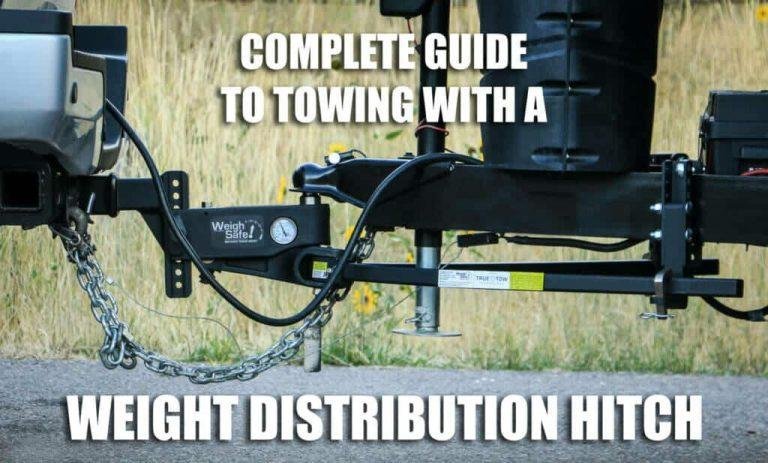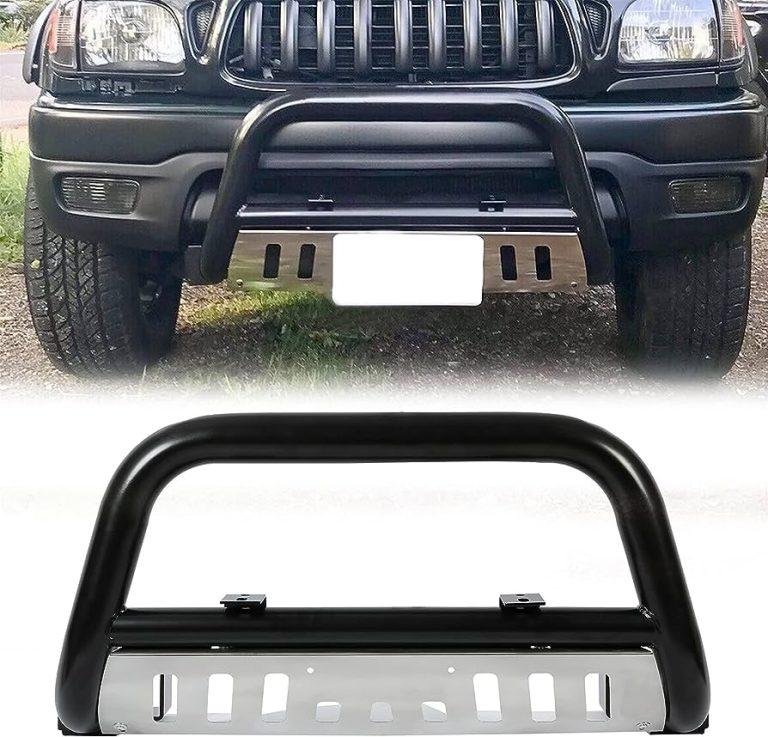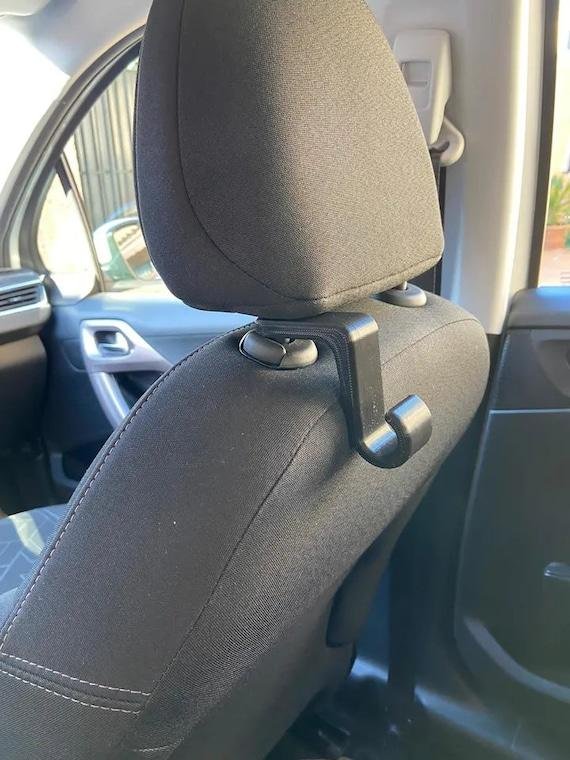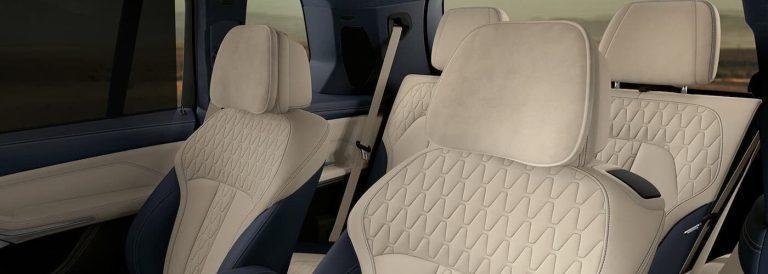Yes, a hitch can be added to any car if the car is structurally capable of supporting the weight of the hitch and the load. Adding a hitch to a car allows it to tow trailers and carry additional cargo, making it a versatile and practical vehicle choice.
Whether you have a compact car or a suv, with the right equipment and installation, you can easily add a hitch to enhance the functionality of your car. It is important to ensure that the hitch and installation meet the vehicle’s towing capacity and any legal requirements to ensure safe and reliable towing.
By adding a hitch, you can expand your car’s capabilities and enjoy the convenience of towing and hauling whenever needed.

Credit: www.amazon.com
Understanding Vehicle Hitches
Hitches can be added to most cars, but it is important to understand the vehicle’s towing capacity and compatibility before installation. Professional assistance is recommended to ensure a secure and safe hitch installation.
Are you considering adding a hitch to your car? Whether you need it for towing a trailer, mounting a bike rack, or simply adding some versatility to your vehicle, understanding vehicle hitches is essential. Let’s explore the different aspects of hitches, including their weight capacity, types available in the market, and factors to consider when selecting the right hitch for your car.
Classifying Vehicle Hitches Based On Weight Capacity:
When it comes to vehicle hitches, weight capacity plays a crucial role in determining their suitability for your needs. Here’s a breakdown of the different classes of hitches based on their weight capacity:
- Class 1: Designed for small cars and light-duty towing, these hitches typically have a weight capacity of up to 2,000 pounds. They are perfect for towing small trailers or carrying lightweight accessories like bike racks.
- Class 2: Suitable for mid-sized cars and compact suvs, class 2 hitches can handle weights up to 3,500 pounds. They offer more towing capabilities and are ideal for towing medium-sized trailers or carrying heavier accessories.
- Class 3: With a weight capacity of up to 6,000 pounds, class 3 hitches are designed for larger vehicles such as trucks, suvs, and vans. They are perfect for towing larger trailers, boats, or even small campers.
- Class 4 and 5: These hitches are heavy-duty options primarily intended for trucks and heavy-duty vehicles. With weight capacities ranging from 6,000 to 20,000+ pounds, they can handle the most demanding towing tasks.
Different Types Of Hitches Available In The Market:
Hitches come in various types, each designed to suit different towing needs. Here are some common types of hitches you’ll find in the market:
- Receiver hitch: The most popular type, receiver hitches are mounted to the rear of the vehicle and offer a versatile platform for towing and carrying accessories. They come in different classes and sizes to match various vehicles and weight capacities.
- Gooseneck hitch: Designed for heavy-duty towing, gooseneck hitches have a ball mount that extends from the bed of the truck. They are commonly used for towing large trailers, flatbeds, or horse trailers.
- Fifth wheel hitch: Similar to gooseneck hitches, fifth wheel hitches are mounted in the bed of a truck. They offer increased stability and weight distribution for towing large, heavy trailers, such as recreational vehicles and horse trailers.
- Bumper hitch: Bumper hitches are attached to the vehicle’s bumper, making them suitable for light-duty towing. They have a lower weight capacity and are commonly used for towing small trailers or carrying lightweight accessories.
Factors To Consider When Selecting A Hitch For Your Car:
Choosing the right hitch for your car involves considering various factors to ensure safety and compatibility. Here are some essential factors to keep in mind:
- Vehicle’s towing capacity: Before selecting a hitch, determine your vehicle’s towing capacity to ensure you choose a hitch that can handle the intended load.
- Hitch compatibility: Ensure that the hitch you select is compatible with your vehicle’s make and model. Check the specifications and consult with professionals if needed.
- Type of towing: Consider the type of towing you plan to do, whether it’s towing trailers, carrying bikes or cargo, or other specific requirements. Different hitches are designed for different towing needs.
- Installation and maintenance: Evaluate the ease of installation and maintenance required for the hitch. Some hitches may require professional installation, while others can be installed by the vehicle owner.
- Safety features: Check for safety features such as built-in sway control, locking mechanisms, and compatibility with trailer brake systems. These features enhance towing safety and stability.
Now that you have a better understanding of vehicle hitches, their weight capacity, different types, and factors to consider, you can make an informed decision when selecting a hitch for your car. Remember to prioritize safety and choose the hitch that best suits your specific towing needs.
Evaluating Car Compatibility
Evaluate car compatibility by determining if you can add a hitch to any car. Discover the options available to safely and effectively attach a hitch to your vehicle for versatile towing capabilities.
Adding a hitch to your car can greatly expand its versatility, allowing you to tow trailers, carry bike racks, and transport other types of cargo. However, not all cars are compatible with hitches, and it’s important to assess your car’s towing capacity and overall compatibility before making a decision.
In this section, we will delve into the key factors that need to be considered when evaluating whether you can add a hitch to any car.
Assessing The Towing Capacity Of Your Car:
- Check your car’s manufacturer specifications or consult the owner’s manual to determine the maximum towing capacity.
- Consider the gross combined weight rating (gcwr) of your car, which includes the weight of the vehicle, passengers, cargo, and trailer.
- Calculate the tongue weight, which refers to the downward force exerted on the hitch ball by the trailer’s coupler. It is typically recommended to keep the tongue weight around 10-15% of the total trailer weight.
Determining If Your Car Can Safely Handle A Hitch:
- Evaluate your car’s chassis and frame strength. Some cars may have lighter frames that are not suitable for towing heavy loads.
- Consider the suspension system of your car. Towing heavy loads can put additional strain on the suspension, affecting the car’s stability and handling.
- Take into account the braking system of your car. Towing requires extra stopping power, so make sure your car’s brakes are capable of safely controlling both the vehicle and the trailer’s added weight.
Checking For Manufacturer Guidelines And Specifications:
- Research the specific guidelines provided by your car’s manufacturer regarding towing capabilities and hitch compatibility.
- Pay attention to any weight restrictions or limitations specified by the manufacturer.
- Consult the owner’s manual or contact the manufacturer directly if you have any questions or concerns.
By carefully evaluating your car’s towing capacity, determining its ability to handle a hitch safely, and following the manufacturer’s guidelines, you can make an informed decision about adding a hitch to your car. Always prioritize safety and ensure that your car is equipped to handle the additional load before embarking on any towing adventures.
The Hitching Process
Yes, it is possible to add a hitch to almost any car, allowing you to easily tow trailers or attach bike racks. With the right equipment and proper installation, you can enhance the functionality of your vehicle for all your hauling needs.
If you’re looking to add a hitch to your car, the hitching process may seem a bit overwhelming at first. However, with the right information and steps to follow, you’ll be able to successfully install a hitch on your own.
In this section, we’ll explore the steps to install a hitch on your car, discuss the pros and cons of seeking professional help versus diy installation, and provide some tips for ensuring a secure and stable hitch attachment.
Steps To Install A Hitch On Your Car:
Installing a hitch on your car may require some time and effort, but it is definitely doable as a diy project. Here are the steps to guide you through the process:
- Research: Start by researching the type of hitch that is compatible with your car’s make and model. Make sure to choose a hitch that meets your towing needs and is specifically designed for your vehicle.
- Gather the necessary tools: Before you begin the installation, gather all the tools you’ll need, such as a socket set, torque wrench, drill, and safety glasses. Having everything ready beforehand will save you time.
- Prepare your car: Park your car on a flat surface and engage the parking brake. It’s also a good idea to use wheel chocks to prevent any movement while you’re working on the hitch installation.
- Remove the bumper: Depending on your car’s model, you may need to remove the rear bumper to access the mounting points. Refer to your car’s manual or online resources for specific instructions on how to remove the bumper safely.
- Attach the hitch: Once the bumper is removed, you can begin attaching the hitch to the mounting points. Follow the instructions provided by the hitch manufacturer carefully to ensure proper installation. Make sure to tighten all bolts and screws securely.
- Reassemble the bumper: After the hitch is securely attached, reassemble the rear bumper according to your car’s manual. Take your time to align it correctly and secure all the fasteners properly.
- Test and fine-tune: Once the hitch is installed, it’s crucial to test its stability and ensure that it aligns properly. Connect a trailer or hitch accessory to check if everything is functioning correctly and that the weight is evenly distributed.
Seeking Professional Help Vs. Diy Installation:
When it comes to installing a hitch on your car, you have the option to seek professional help or opt for a diy installation. Here are some considerations to help you make the best decision:
- Seeking professional help:
- Hiring a professional ensures that the hitch installation is done correctly and efficiently.
- Professionals have experience working with various types of hitches and can offer valuable advice on choosing the right hitch for your needs.
- They have access to specialized tools and equipment, which may result in a more secure installation.
- Diy installation:
- Installing a hitch yourself can save you money on labor costs.
- It allows you to have complete control over the installation process and ensures you understand how everything is fitted.
- Diy installation can be a rewarding project for those who enjoy working on their cars.
Remember, if you choose the diy route, make sure to follow the manufacturer’s instructions closely and take your time to ensure a safe and secure hitch attachment.
Tips For Ensuring A Secure And Stable Hitch Attachment:
To ensure a secure and stable hitch attachment, consider the following tips:
- Choose the right hitch: Select a hitch that matches your car’s towing capacity and is compatible with your vehicle’s make and model. Using the wrong hitch can compromise safety.
- Follow the instructions: Read the manufacturer’s instructions carefully and follow each step precisely. This will ensure proper installation and functionality.
- Use appropriate torque: Use a torque wrench to tighten all bolts and screws as per the recommended torque specifications. This will prevent overtightening or undertightening.
- Check for alignment: Once the installation is complete, visually inspect the hitch to ensure it is aligned properly. Misalignment can cause uneven weight distribution and affect towing stability.
- Regular maintenance: Periodically inspect the hitch, bolts, and mounting points for any signs of wear or damage. Lubricate moving parts as recommended by the manufacturer for smooth operation.
By following these tips and taking the time to install your hitch correctly, you can enjoy a secure and stable attachment, allowing you to tow with confidence. Remember, safety should always be the top priority when hitching your vehicle.
Expanding Hitching Possibilities
Wondering if you can equip any car with a hitch? Explore the possibilities of expanding your hitching options and discover how you can add a hitch to almost any vehicle. Get ready to hit the road with your favorite accessories!
When it comes to adding a hitch to your car, the possibilities are vast. It opens up a whole new world of opportunities for adventure and practicality. Whether you’re looking to transport bikes, tow a trailer, or haul equipment, a hitch can be a game-changer.
In this section, we’ll explore different customization options, discuss how to convert a car without a pre-installed hitch, and share tips on maximizing the versatility of your hitch for various purposes.
Exploring Hitch Customization Options:
- Class i to class v hitches: Hitches come in different classes based on their weight capacity, ranging from class i (up to 2,000 lbs) to class v (up to 17,000 lbs). Consider the type of load you intend to tow and choose a hitch that matches your needs.
- Receiver types: There are two common receiver types – the square receiver and the round receiver. The square receiver is more versatile, allowing you to use various hitch-mounted accessories effortlessly.
- Hitch accessories: Enhance your hitch’s functionality with accessories like bike racks, cargo carriers, or even a hitch step for easy access to your vehicle’s roof. These accessories make your hitch even more versatile and efficient.
- Wiring harness: To safely tow a trailer or use trailer lights, you’ll need a wiring harness. Ensure proper installation to ensure hassle-free connectivity between your car’s electrical system and the trailer lights.
Converting A Car Without A Pre-Installed Hitch:
- Professional installation: Adding a hitch to a car without a pre-installed hitch requires professional installation. Experts can accurately determine the type of hitch suitable for your vehicle and ensure a safe and secure installation.
- Structural modifications: Depending on your car’s design, some structural modifications may be necessary to install a hitch. This can involve trimming or removing parts of the bumper or undercarriage. Trust the expertise of professionals to handle these modifications properly.
- Hidden hitches: If you prefer a clean and unobtrusive look, opt for hidden hitches that can be concealed behind the vehicle’s bumper. These hitches maintain the aesthetics of your car while providing the towing capabilities you need.
Maximizing The Versatility Of Your Hitch For Various Purposes:
- Hitch-mounted bike racks: Transporting bikes becomes effortless with a hitch-mounted bike rack. They offer secure attachment points and keep your bikes stable during travel, allowing you to hit the trails with ease.
- Cargo carriers: Need extra storage space? Hitch-mounted cargo carriers are perfect for road trips or when additional luggage space is required. They come in various sizes and styles, catering to your specific needs.
- Trailer towing: One of the most common uses for a hitch is towing a trailer. Whether it’s for camping, moving, or hauling equipment, having a hitch ensures you can tackle any towing task confidently.
By customizing your hitch, converting a car without a pre-installed hitch, and understanding its various uses, you can expand your options and make your car more versatile than ever before. So, embrace the possibilities and harness the power of a hitch to enhance both your vehicle’s capabilities and your overall lifestyle.
Frequently Asked Questions Of Can You Add A Hitch To Any Car?
How Do I Know If I Can Put A Hitch On My Car?
To determine if you can put a hitch on your car, check your vehicle’s specifications in the owner’s manual or contact the manufacturer. Confirm the maximum towing capacity and if your car has a pre-installed hitch receiver or tow package.
You can also consult a trusted mechanic to assess your car’s structural integrity and towing capabilities. Additionally, consider factors like the weight of the trailer, tongue weight, and the type of hitch required. Follow safety guidelines and adhere to local regulations.
Is It Expensive To Add A Hitch To A Car?
Adding a hitch to a car can vary in cost depending on a few factors. The type of hitch, vehicle make and model, and installation fees all contribute to the overall expense. Generally, hitch prices range from $100 to $500, with additional costs for professional installation.
It is important to consider that a higher-quality hitch may be more expensive but offer better durability and towing capacity. Furthermore, some vehicles may require additional modifications, raising the installation costs. To get an accurate estimate, it’s recommended to consult with a professional who can provide the specific cost based on your vehicle and desired hitch type.
However, it is always advisable to budget for the hitch and installation costs, as they can add up to a significant amount.
Is It Illegal To Drive Around With A Hitch?
Driving around with a hitch is not illegal, but it’s important to follow certain guidelines. Make sure the hitch and its connections are secure to prevent accidents. Additionally, check your vehicle’s towing capacity to ensure it can handle the weight.
Regularly inspect the hitch to ensure it’s in good condition and not damaged. Remember to also consider any local regulations or laws pertaining to hitches when driving in different areas.
What Do I Need To Attach A Trailer To My Car?
To attach a trailer to your car, you’ll need four main things: a hitch receiver, a hitch ball mount, a hitch ball, and safety chains. First, ensure that your car has a hitch receiver installed. This is a device that attaches to the chassis of your car and provides a point to connect the trailer.
Next, you’ll need a hitch ball mount, which is inserted into the hitch receiver. This provides a platform for the hitch ball. The hitch ball is a spherical metal object that screws onto the hitch ball mount. The size of the hitch ball should match the size of the coupler on your trailer.
Finally, safety chains are vital for securing the trailer to your car. These chains are attached to the trailer’s frame and crisscrossed underneath the hitch ball. By following these guidelines, you can safely attach a trailer to your car and enjoy towing capabilities.
Conclusion
Adding a hitch to your car can provide convenience and versatility for various activities. Whether you want to tow a trailer for a weekend camping trip or attach a bike rack for an adventurous outing, a hitch can enhance your car’s functionality.
The good news is that most cars can accommodate a hitch, depending on their size and capabilities. However, it’s crucial to consult your car’s owner manual or check with a professional to ensure compatibility and safety. Remember, adding a hitch may require additional modifications, such as reinforcing the chassis or upgrading the cooling system.
By following the proper guidelines and understanding your car’s limitations, you can enjoy the benefits of a hitch while keeping yourself and your passengers safe on the road. So, if you’re considering adding a hitch to your car, take the necessary steps to determine feasibility and enjoy the newfound freedom it brings.






